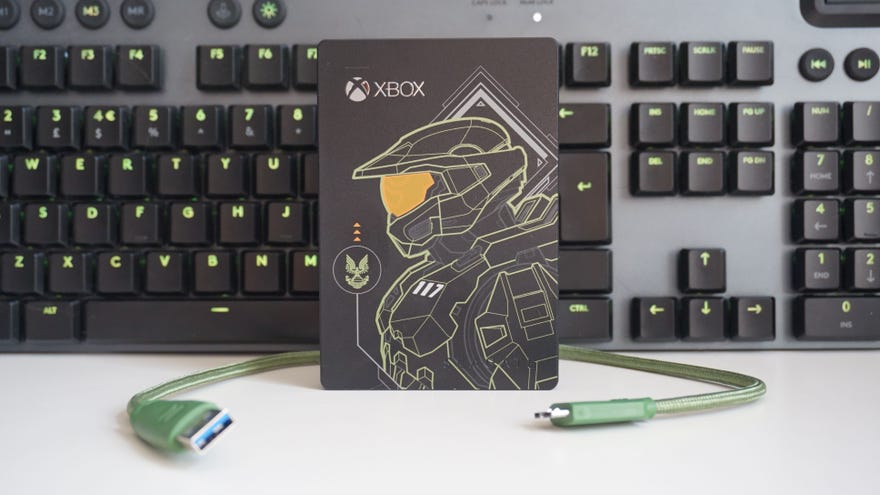Seagate Game Drive for Xbox review
An external HDD that also works perfectly well with PC
External SSDs such as the excellent Crucial X8 or Seagate Barracuda Fast SSD are great devices for taking your files on the go, especially if you don't want to worry about whether every knock, bump or jostle is going to accidentally break your drive as it rattles round in your bag. They sure are expensive, though, which is why many of us still opt for external hard disk drives (HDDs) when it comes to transporting or backing up our files. They might be slower, but they're much, much cheaper. Indeed, whereas a 2TB Crucial X8 will set you back well over £200 / $270, you can currently pick up a 2TB Seagate Game Drive for Xbox for just £63 / $92.
Yep, that's right. Despite having "for Xbox" in its name, Seagate's Game Drive works just as well with PC when it's plugged in via its bundled USB cable. It supports the USB 3.2 Gen 1 standard, so not super brand-new like the cutting-edge USB 3.2 Gen 2 standard, but still pretty modern. It draws its power from its USB connection, too, so you don't need to plug it into the mains for it to work, and its bundled cable should be long enough to rest it on the top of your PC regardless of whether you plug it in on your motherboard.
Seagate's Game Drive for Xbox comes in a variety of size capacities: 2TB, 4TB and 5TB depending on whether you opt for one of its decorated game models. The Halo Master Chief Limited Edition version on test here, for example, comes in 2TB and 5TB, whereas the standard model comes in 2TB and 4TB. There are also fancy Cyberpunk 2077, Sea Of Thieves and Marvel Avengers editions, too.
The key question, though, is whether the Game Drive is worth considering over other external HDDs out there right now, such as the excellent WD Black P10. WD's Black P10 is by far the 'fastest' external HDD I've tested so far, and it's also one of the best value drives around at the moment, too. Seagate's Game Drive for Xbox matches the P10 on price in the UK, with both 2TB models going for the same amount of money at time of writing, but it's WD who has the upper hand over in the US. Can the Seagate's speed make up for the difference in price?

Yes and no. When I put the drive through AS SSD’s 1GB 4K random benchmark, for example, which measures how quickly a drive can read and write 1GB’s worth of tiny 4K files, the Seagate Game Drive came out on top for read speed but fell behind the WD Black P10 on write speed. The former is more important for gaming, as a game needs to open files quickly to help cut down on loading times and the like, but the latter still plays a key role in everyday use, especially when it comes to allocating disk space for games and moving files between different drives.
Admittedly, the Game Drive’s random read speed result of a whopping 0.53MB/s is hardly the most scintillating of figures, but it’s still 39% faster than the WD Black P10’s piddly score of 0.38MB/s, arguably making this the better drive for playing games off if you’ve run out of space on your internal drives. The Game Drive’s write speed, however, left a lot to be desired, even for an external HDD. Again, while this is less important for playing games, a decent write speed is vital when it comes to overall convenience, as no one likes waiting around for hours while they copy lots of big game or photo folders to it. Indeed, whereas the Black P10 managed a random write speed of 3.75MB/s, the Seagate Game Drive finished with a score of just 1.24MB/s, making the WD more than twice as fast in this department as its Seagate rival.
The Black P10 also came out on top for transfer speeds, too. To test this, I used AS SSD’s copy benchmark. This involves transferring three different file types from the OS onto the drive - an ISO folder comprising of two large files, a programs folder with lots of little files, and finally a game folder that's made up of both big and small files. Seagate’s Game Drive inched in front of the P10 on the ISO test, finishing with a score of 121MB/s over the P10’s 112MB/s, but it wasn’t nearly as fast in the other smaller file tests. Its Program score was just 44MB/s, for example, while its Game score came in at 81MB/s. The P10, on the other hand, finished with respective scores of 82MB/s for the Program test and 107MB/s for the Game.
Again, these results won’t exactly set the world on fire (especially when you compare them against the 200-300MB/s transfer speeds you get from an external SSD such as the Crucial X8), but taken altogether, I think I’d still err on the side of the WD Black P10 here. The Seagate Game Drive is probably still worth considering if you’re only going to be using it to play games from, but if you’re after something a bit more multipurpose, then the WD Black P10’s faster write and transfer speeds will mean you’ll spend a lot less time twiddling your thumbs waiting for stuff to happen. Combine that with the three year warranty you get versus the Seagate's one year warranty, and the Black P10 continues to be my external HDD of choice.

